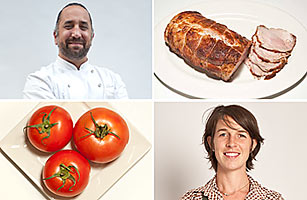
Small farm and organic: in the food business, those magic words open every door. A chef who couldn't use them would be in the same position as a puppy store that couldn't say adorable or a men's magazine that wasn't allowed to use hot. They're universal signifiers, culinary shibboleths that automatically and universally suggest quality to consumers. And generally, that's a fair impression. But sometimes Goliath — in the form of plain, proletariat, grocery-store food — can win. There are numerous cases — infrequent, indeed, but still worth mentioning — in which the supermarket or at least the nonorganic version is better than the one brought to you via 1989 Nissan pickup driven by that Wavy Gravy look-alike from Rutabaga County. To see for ourselves, we asked eight food experts to try two versions of a standard product in their field of special knowledge. While the organic or small-farm product won more often than not, there were a few surprises.
Our blue-ribbon panel of New York chefs consisted of Joey Campanaro of the celebrated seasonal-American restaurant The Little Owl; Anne Saxelby, owner of Saxelby Cheesemongers, a leading artisanal-cheese shop; Riad Nasr and Lee Hanson, co-chefs of the three-star steak house Minetta Tavern; April Bloomfield, whose pork-centric cooking at The Spotted Pig earned her a Michelin star; George Weld, chef-owner of the small, farm-centric restaurant Egg, in Brooklyn; Floyd Cardoz, chef at Tabla, an acclaimed Indian-fusion restaurant; Marco Canora, who helped pioneer the good-food movement as a chef at Gramercy Tavern, Craft and Hearth; and Amanda Cohen, chef-owner of Dirt Candy, one of the country's top vegetarian restaurants.